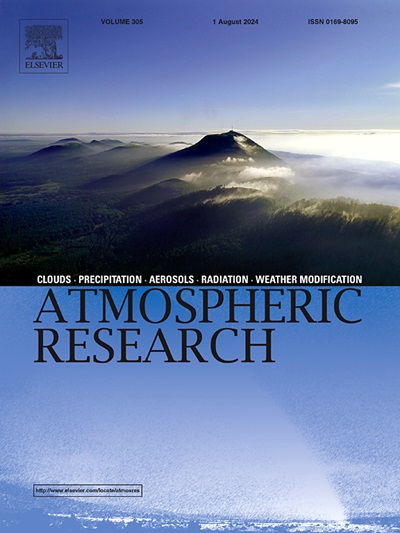基于文献综述的各类闪电放电分形维度分析
IF 4.5
2区 地球科学
Q1 METEOROLOGY & ATMOSPHERIC SCIENCES
引用次数: 0
摘要
在本研究中,我们在广泛查阅文献的基础上,对高速摄像机观测到的自然闪电的照片记录进行了分析。这项工作的目的是估算闪电放电的分形维度,并分析和评估闪电类型(传播过程中的下闪和上闪以及回击)和闪电极性(负极和正极)的影响。我们采用了三种分形维度估算方法,即(i) 方框计数法、(ii) 沙箱法和 (iii) 相关法,利用 MATLAB 软件开发的算法。为保证分形维度估算的精确性,采用了适当的图像处理技术。在实地观测的基础上,将估算出的分形维度值与之前相关文献中记载的值进行了比较,并进行了深入讨论。在三种方法中,向下负向领导的平均分形维度(1.18、1.31、1.38)与之前的研究结果非常一致,而正向向下领导的分形维度值则较低(1.08、1.15、1.26),表明其分支行为有所减少;向上领导的分形维度略高于向下领导。此外,还尝试将闪电回击峰值电流与分形维度联系起来。这项研究的成果可能有助于对雷电附着现象进行精确建模,从而有助于开发更安全的防雷系统。本文章由计算机程序翻译,如有差异,请以英文原文为准。
Fractal dimension analysis of lightning discharges of various types based on a comprehensive literature review
In this study, photographic records of natural lightning flashes obtained from high-speed video camera observations are analyzed based on an extensive literature review. The purpose of this work is to estimate the fractal dimension of lightning discharges and to analyze and evaluate the effect of lightning type (downward and upward flashes during their propagation as well as return strokes) and lightning polarity (negative and positive). Three methods of fractal dimension estimation are employed namely the: (i) box-counting, (ii) sandbox, and (iii) correlation method, utilizing algorithms developed in MATLAB software. Appropriate image processing techniques are employed to guarantee precision in fractal dimension estimation. A thorough discussion is conducted by comparing the estimated fractal dimension values with those previously documented in the relevant literature based on field observations. The mean fractal dimension of downward negative leaders for the three methods (1.18, 1.31, 1.38) aligns well with previous studies, while positive downward leaders exhibit lower values (1.08, 1.15, 1.26), denoting a reduced branching behavior; upward leaders demonstrate slightly higher fractal dimensions than downward ones. Additionally, an attempt to correlate the lightning return stroke peak current with the fractal dimension is made. The outcomes of this research may assist in facilitating precise modeling of the lightning attachment phenomenon, thereby contributing to the development of safer lightning protection systems.
求助全文
通过发布文献求助,成功后即可免费获取论文全文。
去求助
来源期刊

Atmospheric Research
地学-气象与大气科学
CiteScore
9.40
自引率
10.90%
发文量
460
审稿时长
47 days
期刊介绍:
The journal publishes scientific papers (research papers, review articles, letters and notes) dealing with the part of the atmosphere where meteorological events occur. Attention is given to all processes extending from the earth surface to the tropopause, but special emphasis continues to be devoted to the physics of clouds, mesoscale meteorology and air pollution, i.e. atmospheric aerosols; microphysical processes; cloud dynamics and thermodynamics; numerical simulation, climatology, climate change and weather modification.
 求助内容:
求助内容: 应助结果提醒方式:
应助结果提醒方式:


